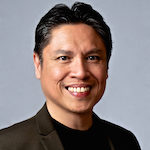
Readings:
Reading 1: Isaiah 63:16B-17, 19B; 64:2-7
Responsorial Psalm: Psalm 80:2-3, 15-16, 18-19
Reading 2: 1 Corinthians 1:3-9
Gospel: Mark 13:33-37
A young man who had more questions than answers in life sought to complete a Master’s degree in Religious Studies in an evening program of a Catholic graduate school of theology. Since he lived in a bustling capital of a Third World country where he also held a day job as editor of a Catholic youth magazine, over and above his ministry as a lay leader of an ecclesial community of young professionals, this meant navigating through some very real, day-to-day challenges. For one, the unforgiving monsoon season meant long waits for public transport through heavy downpours, not to mention walking through dark, flooded streets late at night after classes. Theology books were mostly US imports, and thus often priced beyond reach; as with a number of his peers, his textbooks and references were poor photocopies. But he had a deep hunger for meaning in life, indeed, for God. He kept telling himself that he’d rather eat the scraps that fall from Jesus’ table than partake of a lavish feast elsewhere.
He kept his focus. He showed up. He kept watch late at night, burning long hours studying while the world was asleep. Until one day, after journeying step-by-step for three years, he woke up and realized that his Master’s degree was within reach. He could finally see the horizon.
Mark 13: 33-37, the Gospel reading for this First Sunday of Advent, is a call for watchfulness in anticipation of the glorious coming of the Kyrios, the saving Lord, an event spoken of earlier (vv. 24-26). The timing of Jesus’ coming is unpredictable. It may happen “in the evening, or at midnight, or at cockcrow, or at dawn…” Thus, the disciples need to be vigilant and prepared at all times, in season and out of season, because the Lord’s coming will be sudden. In the context of the Catholic liturgical calendar, we know this is an anticipatory call to prepare for the commemoration of the birth of Jesus. Not to say that it is a signal for the People of God to cram as Advent nears, rather, it is a meaningful touchstone of the pilgrimage of everyday life, akin to what Ada María Isasi-Díaz and other mujerista theologians refer to as “lo cotidiano.” Here, the meaningful cycle of prayerful meditation, self-examination, forgiveness, and solidarity with the poor form the praxical expressions of a lived faith.
For our students at CTU who have found themselves working through a semester of total remote learning in the eye of a pandemic, this may well include staying on course. Keeping their focus. Showing up online. Holding vigil late at night as they burn long hours studying while the world is asleep. And they are not alone. Their peers in the global community are heroically striving to sustain their education. For students living in reduced circumstances in remote villages of the Philippines, Mexico, Tanzania, and other parts of the world where internet access is wanting or nonexistent, vital communitarian connections remain strong as they attend remote classes via transistor radios and other analog platforms.
As they keep watch, may students here and elsewhere hold on to the vision that one day, their goals will be within reach. They will wake up and see the horizon. In faith, we pray the hope-inspiring passage in the first reading from Isaiah, “From ages past no one has heard, no ear has perceived, no eye has seen any God besides you, who works for those who wait for God.” (64:4)
A footnote: the earlier mentioned Third World theology student was me.
Br. Antonio D. Sison, CPPS
Associate Professor of Systematic Theology
Chair, Department of Historical and Doctrinal Studies